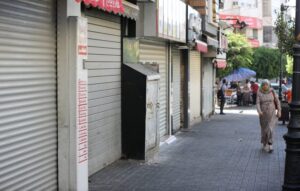Why the West Bank is on the verge of economic collapse

Ramallah during a general strike
Qassam Muaddi writes in Mondoweiss on 11 July 2024:
Last week, Palestinian Authority Prime Minister Muhammad Mustafa announced that the Israeli Finance Ministry had released a part of the customs money that it had withheld from Palestinians for months under the order of its hardline Finance Minister, Bezalel Smotrich.
The amount transferred was reported to amount to $260 million, equivalent to the Palestinian customs money Israel collected on the PA’s behalf for the months of April, May, and June. But even that amount included an important deduction: the share of the Gaza Strip in the customs revenue, the social welfare reserved for the families of martyrs and political prisoners, and the PA’s debts to Israel. Meanwhile, the World Bank decided to dramatically increase its annual aid to the PA from $70 million to $300 million, according to an announcement by PM Mustafa last week.
The reason for this sudden influx of money and the reversal of the Israeli Finance Ministry’s punitive measures against the PA is clear to most observers: the Palestinian Authority is on the edge of an economic meltdown. If it happens, this will likely also trigger the collapse of the PA as a governing authority.
Expectations of such a scenario have been increasingly voiced in recent months, including by the World Bank, as the ongoing economic crisis in the West Bank has been accentuated by Israel’s economic sanctions against the PA since October 7. Smotrich, a pro-settlement hawk, sees the PA as an impediment to the ultimate Israeli goal of settlement expansion in the entire West Bank, despite the PA’s security coordination with Israel.
But the right-wing Finance Minister still agreed to ease some of the sanctions. The reason he did this, according to an unnamed Western diplomatic source quoted by al-Araby al-Jadeed, is that the transfer was part of an agreement between the U.S. and Israel. Israel would release the withheld customs money, and in exchange, the U.S. would allow Israel to “legalize” four Israeli settlement outposts in the northern West Bank (notably, Israel already started this legalization process a year ago under Netanyahu’s right-wing government). Moreover, just last week, Israel announced the single largest Palestinian land grab in over 30 years, seizing 1,269 hectares of land in the Jordan Valley region.
Yet even the partial loosening of restrictions on withheld customs money to the PA doesn’t come close to solving the PA’s economic crisis. Israel’s economic sanctions have forced hundreds of thousands of Palestinian public sector employees to survive on little to no salaries for months on end, while Israel still maintains its revocation of work permits for the some 100,000 Palestinian laborers who used to work in Israel and in Israeli settlements before October 7.
These measures have crippled the flow of money in the West Bank, leading to an inflation of prices and pushing hundreds of thousands of families into poverty.
